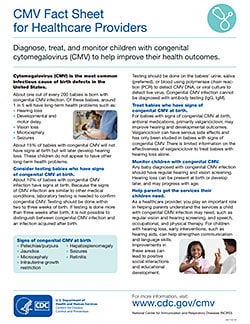CMV Fact Sheet for Healthcare Providers
Diagnose, treat, and monitor children with congenital cytomegalovirus (CMV) to help improve their health outcomes.
Cytomegalovirus (CMV) is the most common infectious cause of birth defects in the United States.
About one out of every 200 babies is born with congenital CMV infection. Of these babies, around 1 in 5 will have long-term health problems such as:
- Hearing loss
- Developmental and motor delay
- Vision loss
- Microcephaly
- Seizures
About 15% of babies with congenital CMV will not have signs at birth but will later develop hearing loss. These children do not appear to have other long-term health problems.
Consider testing babies who have signs of congenital CMV at birth.
About 10% of babies with congenital CMV infection have signs at birth. Because the signs of CMV infection are similar to other medical conditions, laboratory testing is needed to confrm congenital CMV. Testing should be done within two to three weeks of birth. If testing is done more than three weeks after birth, it is not possible to distinguish between congenital CMV infection and an infection acquired after birth.
Testing should be done on the babies’ urine, saliva (preferred), or blood using polymerase chain reaction (PCR) to detect CMV DNA, or viral culture to detect live virus. Congenital CMV infection cannot be diagnosed with antibody testing (IgG, IgM).

- Petechiae/purpura
- Jaundice
- Microcephaly
- Intrauterine growth restriction
- Hepatosplenomegaly
- Seizures
- Retinitis

Treat babies who have signs of congenital CMV at birth.
For babies with signs of congenital CMV at birth, antiviral medications, primarily valganciclovir, may improve hearing and developmental outcomes. Valganciclovir can have serious side effects and has only been studied in babies with signs of congenital CMV. There is limited information on the effectiveness of valganciclovir to treat babies with hearing loss alone.
Monitor children with congenital CMV.
Any baby diagnosed with congenital CMV infection should have regular hearing and vision screening. Hearing loss can be present at birth or develop later, and may progress with age.
Help parents get the services their children need.
As a healthcare provider, you play an important role in helping parents understand the services a child with congenital CMV infection may need, such as regular vision and hearing screening, and speech, occupational, and physical therapy. For children with hearing loss, early interventions, such as hearing aids, can help strengthen communication and language skills. Improvements in these areas can lead to positive social interactions and educational development.
